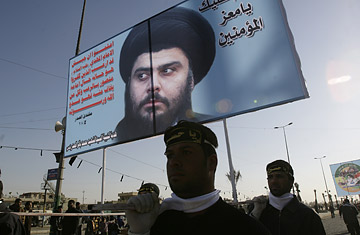
Followers of a radical anti-U.S. cleric Moqtada al-Sadr carry his portrait during a ceremony to mark a fourth anniversary of the Shi'ite uprising against the American occupation in Sadr City, Baghdad, Iraq, Thursday, February 21, 2008.
Shi'ite radical Moqtada al-Sadr's Mahdi Army may have been bloodied by recent confrontations in Basra and Baghdad, but he is cranking up the heat on the government of Prime Minister Nouri al-Maliki with a new political-military program carefully tailored to the preferences of Iraqi public opinion. At mosques around Iraq on Friday, his acolytes read a statement outlining new marching orders for his Mahdi Army militia aimed at maximizing his political support ahead of provincial elections scheduled for the fall.
A select group of Mahdi Army fighters would continue to bear arms and use them against U.S. forces as long as they remain in Iraq. "Weapons will be in the hands of this group exclusively and will be directed only at the occupier," Sadr's statement said. The rest of the militia, believed to number some 60,000 members, would focus on civic projects and religious initiatives that serve the needs of the Shi'ite community, Sadr said.
The new policy signals an end to Sadr's patience for the tattered unilateral cease-fire, which nominally restrained his men against U.S. troops this spring even as heavy fighting unfolded in southern Iraq and eastern Baghdad. More significantly, however, his new guerrilla approach seemed to exempt Iraqi government forces from attack by the Mahdi Army, while pitting his legions in a head-to-head political battle with al-Maliki for the hearts and minds of Iraqi voters ahead of the provincial elections. And continuing to fight U.S. forces seems to reflect an awareness that their long-term presence in Iraq is resented by a majority of Iraqis — a resentment that also appears to have caused a stalemate in negotiations between the Iraqi and U.S. governments over a security agreement providing for a long-term American presence in Iraq.
Sadr has good reason to concentrate on the election — his followers are poised to take the majority of open seats in southern Iraq and in large parts of Baghdad But two things could derail a massive victory at the polls: One would be a public relations disaster like the bloody firefight Sadr's fighters sparked outside a venerated Shi'ite shrine in Karbala roughly a year ago, the episode that led Sadr to declare a cease-fire in the first place. Sadr's new humanitarian drive appears aimed at shoring up his public image in the months before the vote by upstaging al-Maliki's predominantly Shi'ite government, which has struggled to provide basic services even in areas where his supporters live.
The second danger is a campaign by government supporters to keep the Sadrists off the ballot, which could spark a new confrontation in the months ahead. Sadr's followers are confident in taking on the government at the polls, but they are already accusing the government of laying the groundwork for a rigged election that would hand provincial power to the Sadrists' main rivals, the government-aligned Supreme Islamic Iraqi Council and its own militia, the Badr Brigade.
"They know that the Sadrist movement will win in the south," said a senior official from the main Sadr office in Baghdad who spoke on condition of anonymity. "I don't think we're going to have a chance."
Iraq's Independent High Electoral Commission has vowed to ensure a fair contest and avoid the problems that troubled the last round of provincial balloting in 2005. Haider al-Furaijy, the deputy commissioner, says there are no signs of foul play aimed at the Sadrists or anyone else. "So far I don't think this is true," al-Furaijy said. "We are going to take all the necessary procedures to keep the votes clean."
Al-Furaijy acknowledged, however, that the government is blocking "militias" from the electoral process — and that term is code for the Sadrists, despite the government keeping the Badr Brigade in its corner. If the Sadrists are kept out of the coming elections, Sadr may once again order his people, armed and unarmed, onto the streets to confront the Iraqi government — a scenario that, given the massive support Sadr enjoys among the Shi'ite urban poor, would almost certainly end the relative calm that has settled over Iraq in recent months.
